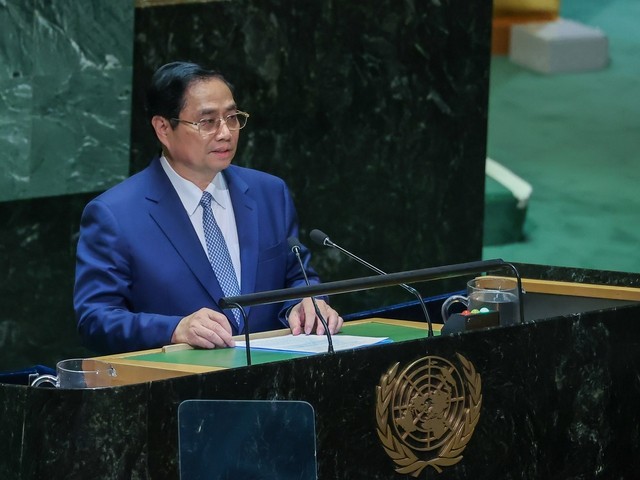The Prime Minister’s priority of “strategic trust” as a central solution to global problems not only helps highlight this year’s meeting theme of “Rebuilding trust and promoting global solidarity,” but also reflects the astute background and maturity of Vietnamese modern diplomacy, as reported by Tuoi Tre Newspaper.
According to Chinh, the world is currently facing serious crises in trust, multilateral cooperation, principles, and resources that need to be resolved in order to support the implementation of development goals. He emphasized the need for countries, especially major powers, to show sincerity, strengthen strategic trust, and take responsibility towards the world.
An important global solution is to promote solidarity, international cooperation, and multilateralism, with the United Nations at the core, to support the implementation of the Sustainable Development Goals, said Chinh.

|
| PM Pham Minh Chinh delivered his speech at the general debate of the 78th session of the UN General Assembly (UNGA 78) in New York on September 22 (Photo: Nhat Bac). |
“Strategic trust” and “people-centered” policies should be promoted
Chinh highlighted the position and role of people as the goals, subjects, driving forces, and resources of sustainable development, suggesting that people-centered policies should be promoted in all policy-making processes and actions to ensure no one is left behind.
The Vietnamese leader underlined the importance of introducing comprehensive solutions economically, politically, and socially to ensure stability, security, and safety.
In line with this, it is imperative to build and transform green economic models, digital economy, circular economy, sharing economy, knowledge economy, while promoting innovation and startups. This direction will help reduce trade and investment barriers, strengthen free trade agreements, and reform international financial and monetary institutions.
He also suggested effectively mobilizing and using resources, enhancing self-reliance, innovation and startups, and promoting all potential and strengths.
Developing and underdeveloped countries, especially those suffering the severe consequences of climate change, natural disasters, and epidemics, should receive support in finance, technology, and human resource training and coordinated governance, said the Vietnamese PM.
Vietnam is an active and responsible member of the international community
He reiterated Vietnam’s foreign policy of independence, self-reliance, diversification, and multilateralization of foreign relations while being a good friend, a reliable partner of all countries, and an active and responsible member of the international community.
Vietnam will continue to contribute more strongly and responsibly to the United Nations’ priorities, including peacekeeping engagement, net zero emissions commitments, and food security, as reported by VOV.
“Vietnam is committed to working closely alongside other countries to maintain peace, stability, security, safety, and freedom of navigation in the East Sea in line with international law, including the 1982 United Nations Convention on the Law of the Sea (UNCLOS), while avoiding unilateral actions and resolving disputes and differences by peaceful and cooperative means,” claimed the PM.
|
During his stay in the US until September 23, Vietnamese Prime Minister Pham Minh Chinh attended and addressed the high-level general debate of the UN General Assembly, the UN Summits and high-level meetings on global issues such as climate change and pandemic response. He also engaged in bilateral meetings with the UN Secretary General, President of the 78th session of the UN General Assembly, and leaders of other countries and international organizations, as reported by VNA. Chinh left New York on early September 23 (local time) and set off for a four-day official visit to Brazil. He will be the first leader of the Vietnamese Party and Government to pay an official visit to Brazil since the trip by then Party General Secretary Nong Duc Manh in 2007. |
The East Sea: Cooperation for security and development
At the 10th South China Sea (East Sea) International Conference, many scholars shared the view that the activity of reinforcing force-building and militarization in the sea poses the biggest risk of uncertainty to the region. To maintain peace and stability in the sea, legal experts stressed the observance of international law for settling disputes by peaceful means without using forces or threatening to use forces.








